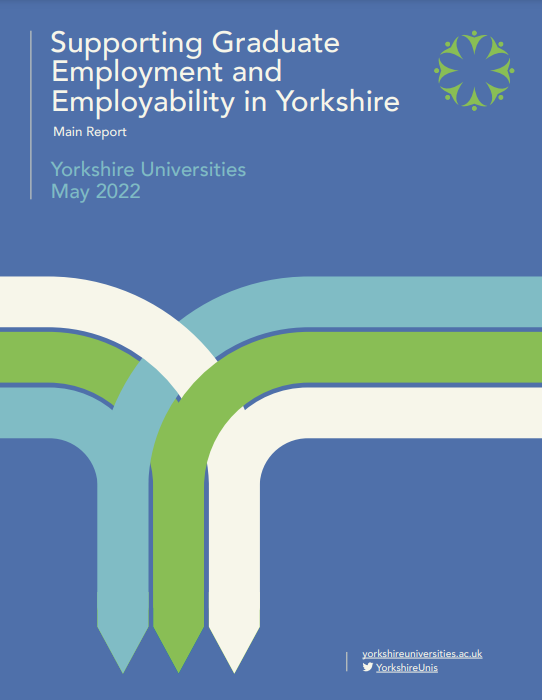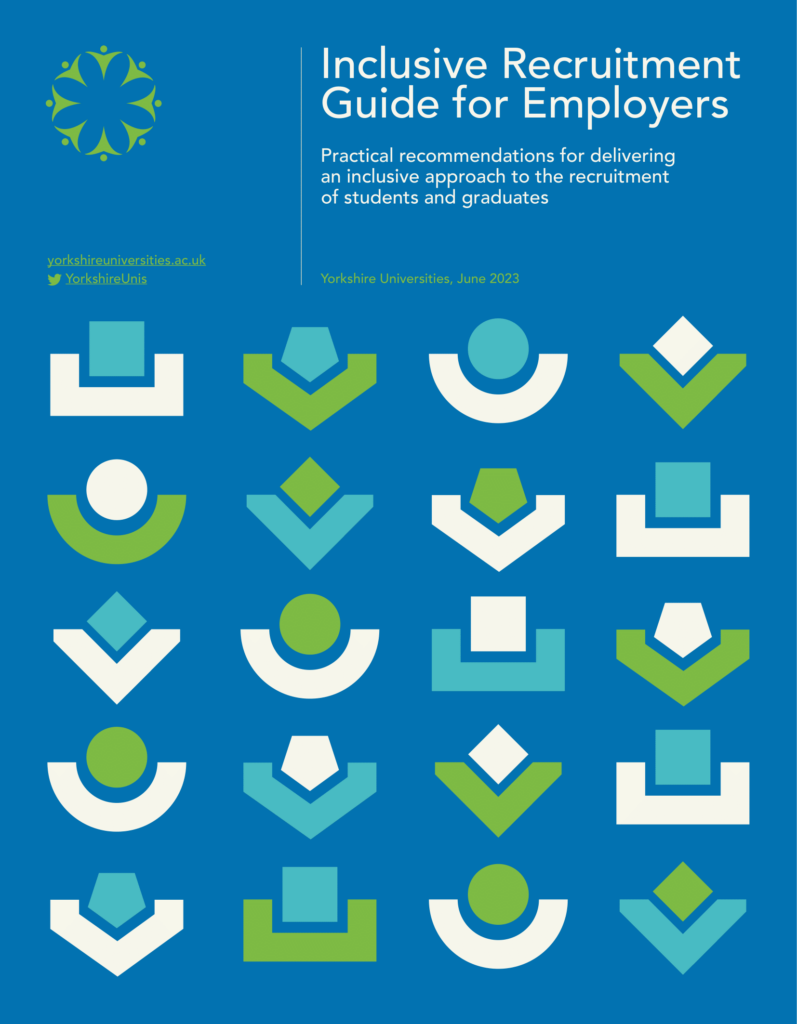
Universities are dedicated to supporting graduate employability and employment, as well as broader student success as defined by students themselves.
Working on the links between education and employment at a regional level is important in order to address the geographic inequalities entrenched in the education system from an early age and in regional and local labour markets, as well as to support local and regional skills needs and broader economic development. There is already a lot of existing work across the region in this area but there remains an ongoing role for Yorkshire Universities (YU) to continue to improve coordination and collaboration.

In May 2022, Yorkshire Universities (YU) published a collaborative report on Supporting Graduate Employment and Employability in Yorkshire. Since the publication of the report university colleagues have formed an Implementation Group that is actively working on operationalising the shared priorities of the report. The Graduate Implementation Group and related sub-groups are working on improving collaborative action to support graduate employment and employability across the HE sector and through working with external stakeholders including colleagues from local and central government, business representative organisations and employers, as well as students.
Take a look at both the Executive Summary and the Full Report.
As well as the groups it convenes, YU is leading on particular actions around making it easier for employers to understand the HE offer and the ways they can engage with a diverse pool of student and graduate talent. This work includes amplifying examples of good practice and key messages around the value of working with students and graduates through our case study repository.
If you would like to get involved or find out more about this work, please get in touch with us.
Graduate Talent Related Groups
Convened by Yorkshire Universities (YU), the twelve member universities, local authorities, mayoral combined authorities, local enterprise partnerships and employers in Yorkshire came together as a Task and Finish Group to consider how best to support more students and graduates through the challenging times of the pandemic and beyond. In May 2022, Yorkshire Universities (YU) published a collaborative report on Supporting Graduate Employment and Employability in Yorkshire.
Since the publication of the report, the Graduate Implementation Group and related sub-groups are working on operationalising the recommendations of the report to improve collaborative action to support graduate employment and employability across the HE sector and through working with external stakeholders.
- Graduate Implementation Group
- Graduate Data Group
- EDI Oversight & Planning Group

Graduate Implementation Group
The Graduate Implementation Group (GIG) is an oversight and advisory group that was established to help operationalise the shared priorities and recommendations as agreed in the Supporting Graduate Employment and Employability in Yorkshire Report. Where possible, the GIG aims to build on existing activity, amplify common messages and advocate for shared learning among the YU member institutions.

Professor Tim Thornton
Chair of the GIG and Deputy Vice-Chancellor, University of Huddersfield
Tim studied at New College, Oxford. In 1997 he was awarded the Royal Historical Society’s David Berry Prize for his work on the Isle of Man; in 1999 he was proxime accessit for the Society’s Alexander Prize for an essay on the palatinate of Durham. He was the first scholar based in a new University to win one of the Society’s prizes.
Appointed Head of the Department of History, English, Languages and Media in 2003, Tim was on secondment as Head of University Centre Barnsley during 2005-6 and became Dean of the School of Music, Humanities and Media in October 2006. He was appointed Pro Vice-chancellor (Teaching and Learning) in October 2008 and then became Deputy Vice-Chancellor in September 2015.
Group Members
- Joanne Beaumont, Associate Director Student Services: Careers, Employability and Engagement, University of Bradford
- Jane Campbell, Head of Student Careers, University of Leeds
- Barrie Grey, Head of Student and Graduate Employability, York St John University
- John Harrison, Head of Student Futures, University of Hull
- Esther Kent, Director, Employability & Student Futures, Sheffield Hallam University
- Dan Lally, Director of Skills and Partnerships, Sheffield Hallam University
- Emily Timson, Director of Graduate Outcomes and Enterprise, Leeds Trinity University
- Hannah Smith, Director of Student Careers and Systems, University of York
- Mark Stow, Director of Careers and Employability, Leeds Beckett University
- Andrew Jones, Head of Careers, Employability and Enterprise, Leeds Arts University
- Helen Smith, Head of Careers, University of Sheffield
- James Warrender, Employability & Enterprise Manager, Leeds Conservatoire
- Claire Aydogan, Head of Careers and Employability, University of Huddersfield
Graduate Data Group
The main aim of the Graduate Data Group (GDG) is to support the work of the GIG and any other relevant sub-groups (e.g. EDI) in implementing the priorities and recommendations of the YU report through the sharing and analysis of data. The group’s work particularly supports the use of data for the development of effective strategy and action, as well as to help develop common messages around the value of graduates.
Our Policy and Research Officer, Marina Tapley, is the current chair of the GDG.
Group Members
- Daniel Penn, Careers Data and Planning Officer, University of Bradford
- Dr Keith McCabe, Head of Planning and Business Intelligence, University of Huddersfield
- Dr Rebecca Kendall, Team Leader, Performance, Evaluation & Monitoring, Student Futures, University of Hull
- James Boyes, Strategic Planning & Reporting Analyst, Leeds Arts University
- Jill Richards, Digital Content & Data Insights Coordinator, Leeds Beckett University
- James Warrender, Employability & Enterprise Manager, Leeds Conservatoire
- Andrew Blunt, Student Opportunity Insights & Engagement Manager, SES Business Insights Lead, Graduate Outcomes Lead, Target Connect Lead, University of Leeds
- Jack Carling, Data and Systems Manager (Graduate Outcomes Directorate), Leeds Trinity University
- James Berry, Head of Data Visualisation Strategy, Planning and Insight, Sheffield Hallam University
- Helen Armitage, Head of Student Futures, Sheffield Hallam University
- Gemma Halliwell, Data, Insights and Engagement Manager, University of Sheffield
- William Jones, Data and Impact Analyst, Student Success and Employability, York St John University
- James Woodward, Careers Data and Systems Manager, Student Data and Management Information, University of York
Associate Members
- Dr Bob Gilworth, Senior Lecturer in Careers Guidance, University of Huddersfield
- Dr Charlie Ball, Head of Labour Market Intelligence, Jisc
- Helen Sykes, Head of Go Higher West Yorkshire, Go Higher West Yorkshire
EDI Oversight & Planning Group
The EDI Oversight & Planning Group (or EDI group for short) is working on advancing work towards the recommendations of the report with a focus on the overarching theme of Equality, Diversity and Inclusion. The EDI Group works closely with the Graduate Data Group and carries out activity in the following areas:
- Staff Training and Development,
- Universities as Employers of Graduates, and
- Employer Engagement.
The co-chairs of the EDI Group are Joanne Beaumont, Associate Director Student Services: Careers, Employability and Engagement at the University of Bradford, and Jane Campbell, Head of Student Careers at the University of Leeds.
A key output from the EDI Group is the Regional Inclusive Recruitment Guide, offering a set of practical recommendations for delivering an inclusive approach to the recruitment of students and graduates. This guide has been produced for SME businesses based within Yorkshire and the Humber, by the Yorkshire Universities Group, using a foundational resource initially developed by the University of Sheffield.
WHAT’S NEW?
- New Analysis of Higher Level Skills in Yorkshire and Humber Labour Markets
- YU’s Contribution to the Skills 2030 Inquiry
- Higher Education Policy Landscape – Summer 2023














